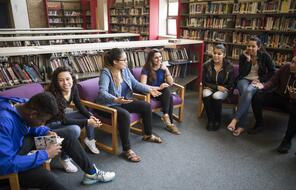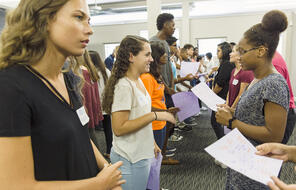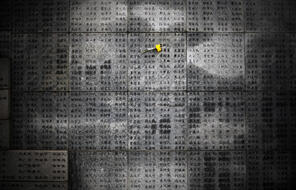Resource Library
Find compelling classroom resources, learn new teaching methods, meet standards, and make a difference in the lives of your students.
We are grateful to The Hammer Family Foundation for supporting the development of our on-demand learning and teaching resources.

Introducing Our US History Curriculum Collection
Draw from this flexible curriculum collection as you plan any middle or high school US history course. Featuring units, C3-style inquiries, and case studies, the collection will help you explore themes of democracy and freedom with your students throughout the year.
3349 Results
Identity and Storytelling
Designed for students in grades 9-10, this text set includes lesson plans and multi-genre texts for a 1–2 week unit exploring the essential question, "What makes me, me?"
Holocaust and Human Behavior
Explore the digital version of our core resource on the Holocaust. Find classroom-ready readings, primary sources, and short documentary films that support a study of the Holocaust through the lens of human behavior.

Spanish Translations from Holocaust and Human Behavior
Get Spanish-language versions of popular readings from Holocaust and Human Behavior.

Teaching Holocaust and Human Behavior
Use this 23-lesson unit to lead middle or high school students through a study of the Holocaust that asks what this history can teach us about the power and impact of choices.

My Part of the Story: Exploring Identity in the United States
Help students understand that their voices are integral to the story of the United States with six lesson plans that investigate individual and national identity.

Community Matters: A Facing History & Ourselves Approach to Advisory
Our advisory curriculum for grades 8–10 contains a year’s worth of activities, handouts, and best practices for establishing inclusive communities where students can engage in honest discussions and build their voices.

Identity & Community: An Introduction to 6th Grade Social Studies
Intentionally designed for middle school classrooms, this unit explores themes of identity and community by using students' knowledge of the Memphis, Tennessee, community.

Teaching Mockingbird
Learn how to incorporate civic education, ethical reflection and historical context into a literary exploration of Harper Lee's novel, To Kill A Mockingbird.

Teaching the Nanjing Atrocities
Lead students through a study of the Nanjing atrocities, beginning with an examination of imperialism in East Asia and ending with reflection on justice in the aftermath of mass violence.

Teaching the Holocaust and Armenian Genocide: For California Educators
Designed for California 10th grade world history courses, this unit guides students through a study of the Holocaust and the Armenian Genocide that focuses on choices and human behavior.

Teaching Who Will Write Our History
Invite students to reflect on why it matters who tells our stories as they view a documentary film about the profound courage and resistance of the Oyneg Shabes in the Warsaw ghetto.

For Educators in Jewish Settings: Teaching Holocaust and Human Behavior
Developed specifically for educators in Jewish settings, these lessons lead middle and high school students through an examination of the Holocaust from a historical perspective and consider what this particular history has to do with what it means to be Jewish.


